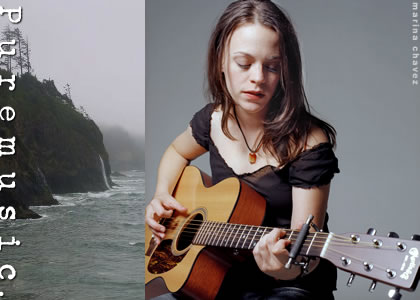
A Conversation with Mindy Smith (continued)
PM: So you did that first short-lived band in Cincinnati, and then what happened? What brought you to Knoxville?
MS: Oh, my father moved to Knoxville. And I couldn't afford to live in New York anymore by myself, so I followed him on down there.
PM: And you were in your early twenties at this point, right?
MS: Hang on one second, Frank.
PM: Okay.
MS: Can I get Provolone on that instead of Swiss? And a cup of coffee. Oh, gosh, the smaller of the two.
Sorry, I'm getting a cup of coffee here.
PM: It's amazing how many interviews I've done with people who are ordering lunch while we're on the phone.
[laughter]
MS: Oh, well. I drove around for an hour. I can't ever find any food that I like, so I'm always driving around. And I came in here once, this place, Caffeine--I came in here one time and they actually--my favorite coffee shop in town closed down.
PM: Which one?
MS: Bean Central.
PM: Oh, yeah.
MS: And now they're making their coffee and then they give it to this place, Caffeine.
PM: I haven't been there yet because it's kind of a Vandy hang, isn't it?
MS: See, you could have been joining me here, but no.
PM: So how was Knoxville for you? That was yet another new experience. What happened there?
MS: I think I never knew that you could go out and do songwriters' nights until I moved to Knoxville. I never knew that. And actually, Knoxville, at least when I was there, they had a strong music community and they thrive on supporting each other. They thrive on getting out and sharing their music. It's completely pure. As far as I can tell, it's not anything other than "Hey, we just want to hear good music, something original, or we want to participate in it." And that's the vibe I got when I lived there. It was a really important transition in my life, because I needed to be supported. I'd never really had that with people. I mean, I did with my friends, but not like I did when I finally moved to Knoxville. I really needed somebody to just shake me up and say, "Look, you need to just keep at it." And I had that when I was there, which is pretty outstanding.
PM: Yeah, it's really, really important.
MS: Uh-huh.
PM: So were you starting to come up with good songs early on, or did the--
MS: Oh, hell no.
PM: No?
MS: No! I mean, I had--my first song I wrote, I think it is still a good song, but--
PM: Have I ever heard it?
MS: I don't know if you have. I'll have to play it for you sometime.
PM: What's it called?
MS: It's called "Like the River."
PM: Yeah, it's not familiar as a title, but...
MS: I definitely had a certain melodic sense, but it was all around minor keys. I was still coping with a lot of things, too, at the time. There wasn't a lot of structure to my writing yet, and there was still a lot of work to do. I wanted to learn how to become a better songwriter, and I'm still working on it. Every time I sit down to write a song, I'm trying to be a better writer. Or I'm always trying to top my last song, on my own personal critiquing scale.
PM: Yeah. I'll talk about it in the setup to this interview, but Tom Kimmel first played your songs for me in his SUV, I think it was, at that Kerrville Festival a couple three years ago and he said, "I'm going to play you something, man. Let's take a ride around." And since that time--your songs really stood out to me immediately when I heard them, both melodically and lyrically. I mean, that's nearly a miraculous thing, when one hears so many songs and songwriters that may be good, but don't stand out. Can you say anything about your songwriting, the intention or the process that makes them stand out the way they do?
MS: Can I say anything about that?
PM: Yeah, is there anything about your intention when you sit down to write that makes those songs turn out in a way that stands them out?
MS: Oh, I'm very driven melodically when I write. A song needs to have a good melody for me to be interested in it enough to write a lyric. [laughs] If I don't have a good melody, I'm not interested in it. That's the bottom line for me. And if I'm able to achieve getting a decent lyric to go with the melody, that's a big deal for me, because I'm not necessarily--I don't write from a lyricist standpoint like some writers do. Like your Shawn Colvins and your John Prines, people who write from a very lyrical perspective, I don't do that.
PM: It's melody first, melody above all.
MS: It's melody first. And then usually the melody will write the song for me. [laughs] Once I establish where the song is going melodically, nine times out of ten the song writes itself.
PM: Now, is it only in quite recent years that you've been getting into writing with other people?
MS: Yeah. It's not really a natural progression for me at all.
PM: So how did it take place--not until you got to Nashville, or did co-writing start in Knoxville?
MS: It started in Nashville. continue